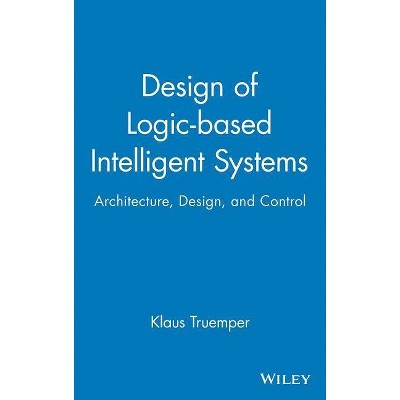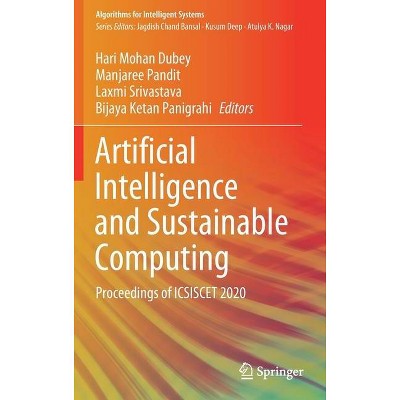Design of Logic-Based Intelligent Systems - by Klaus Truemper (Hardcover)

Similar Products
Products of same category from the store
AllProduct info
<p/><br></br><p><b> Book Synopsis </b></p></br></br>Principles for constructing intelligent systems<br /> Design of Logic-based Intelligent Systems develops principles and methods for constructing intelligent systems for complex tasks that are readily done by humans but are difficult for machines. Current Artificial Intelligence (AI) approaches rely on various constructs and methods (production rules, neural nets, support vector machines, fuzzy logic, Bayesian networks, etc.). In contrast, this book uses an extension of propositional logic that treats all aspects of intelligent systems in a unified and mathematically compatible manner.<br /> Topics include: <br /> * Levels of thinking and logic<br /> * Special cases: expert systems and intelligent agents<br /> * Formulating and solving logic systems<br /> * Reasoning under uncertainty<br /> * Learning logic formulas from data<br /> * Nonmonotonic and incomplete reasoning<br /> * Question-and-answer processes<br /> * Intelligent systems that construct intelligent systems<br /> Design of Logic-based Intelligent Systems is both a handbook for the AI practitioner and a textbook for advanced undergraduate and graduate courses on intelligent systems. Included are more than forty algorithms, and numerous examples and exercises. The purchaser of the book may obtain an accompanying software package (Leibniz System) free of charge via the internet at leibnizsystem.com.<p/><br></br><p><b> From the Back Cover </b></p></br></br><p><b>Principles for constructing intelligent systems</b></p> <p><i>Design of Logic-based Intelligent Systems</i> develops principles and methods for constructing intelligent systems for complex tasks that are readily done by humans but are difficult for machines. Current Artificial Intelligence (AI) approaches rely on various constructs and methods (production rules, neural nets, support vector machines, fuzzy logic, Bayesian networks, etc.). In contrast, this book uses an extension of propositional logic that treats all aspects of intelligent systems in a unified and mathematically compatible manner.</p> <p>Topics include: </p> <ul> <li>Levels of thinking and logic</li> <li>Special cases: expert systems and intelligent agents</li> <li>Formulating and solving logic systems</li> <li>Reasoning under uncertainty</li> <li>Learning logic formulas from data</li> <li>Nonmonotonic and incomplete reasoning</li> <li>Question-and-answer processes</li> <li>Intelligent systems that construct intelligent systems</li> </ul> <p><i>Design of Logic-based Intelligent Systems</i> is both a handbook for the AI practitioner and a textbook for advanced undergraduate and graduate courses on intelligent systems. Included are more than forty algorithms, and numerous examples and exercises. The purchaser of the book may obtain an accompanying software package (Leibniz System) free of charge via the internet at <b>leibnizsystem.com.</b></p><p/><br></br><p><b> Review Quotes </b></p></br></br><br>....both a handbook for the AI practitioner and a textbook for advanced undergraduate and graduate courses on intelligent systems. (<i>International Journal of General Systems</i>, June 2005) <p>...extremely well-written and insightful and has educational benefits even for those not intending to use the material directly. (<i>IIE Transactions-Operations Engineering</i>, March 2005)</p> <p>...the book reads well and can be highly recommended. (<i>Journal of Intelligent & Fuzzy Systems</i>, Vol. 16, No. 3, 2005)</p> <p>...will greatly interest you and your advanced students...a useful book. (<i>Computing Reviews.com</i>, February 16, 2005)</p> <p>...extremely well written and insightful and has education benefits even for those not intending to use the material directly. (<i>IIE Transactions on Operations Engineering</i>)</p> <p>Truemper offers definitive, state-of-the art coverage of this area. (<i>CHOICE</i>, November 2004)</p> <p>...the author's novel approach has something going for it, and that some good examples of intelligent reasoning can be achieved by fitting them into the author's model. (<i>Computing Reviews.com</i>, August 2, 2004)</p><br><p/><br></br><p><b> About the Author </b></p></br></br><p><strong>Klaus Truemper</strong> is a professor of computer science at the University of Texas at Dallas. He is the author of two books, including <strong>Effective Logic Computation</strong> (Wiley, 1998).
Price History
Price Archive shows prices from various stores, lets you see history and find the cheapest. There is no actual sale on the website. For all support, inquiry and suggestion messagescommunication@pricearchive.us




















